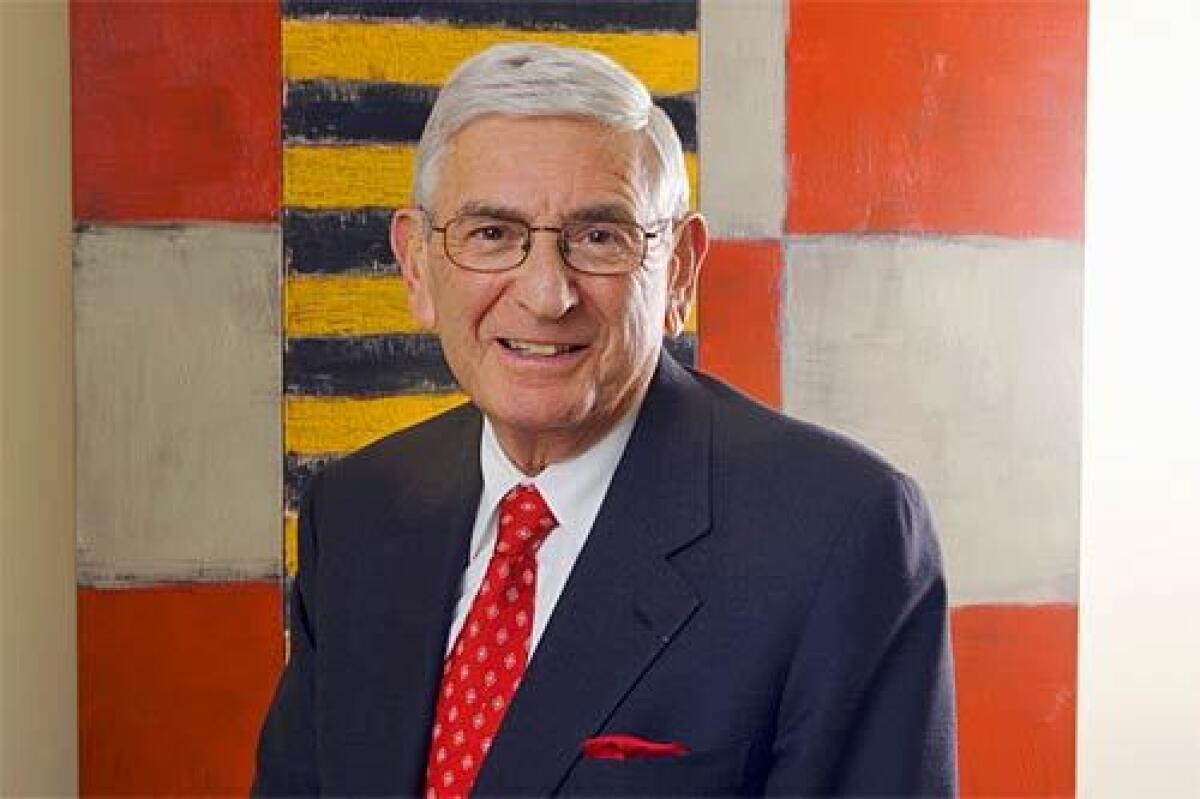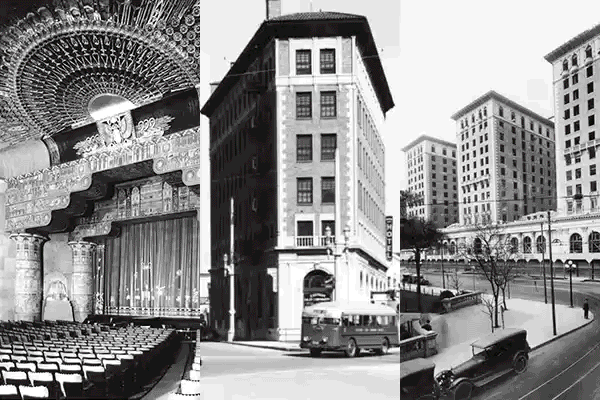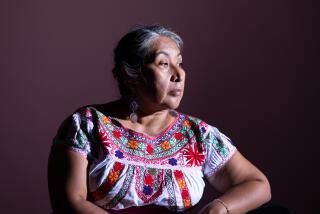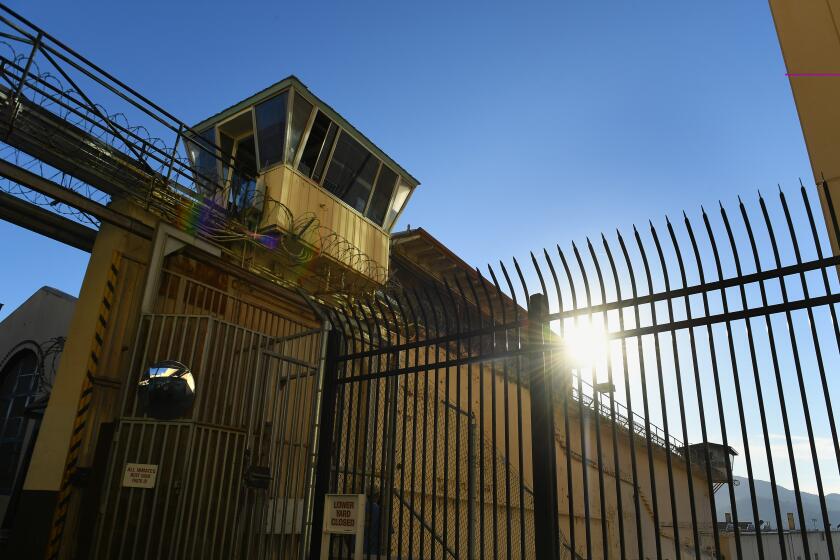The Broad view of L.A.

This is the fifth in an occasional series of conversations with Southern California activists and intellectuals. The series and videotaped interviews with the subjects are collected at www.latimes.com/news/ opinion/lavisions/.
Rare is the civic conversation in Los Angeles that does not involve Eli Broad. Whether the topic is the arts, education, politics or the fate of the city’s largest newspaper, Broad invariably is at the table.
A billionaire several times over from home building and insurance, Broad did not make his fortune by being shy. Nor has he receded from civic leadership in retirement. Now 74, he presents himself precisely as he has for more than a decade: beneath trimmed white hair, pocket square neatly fashioned, eyes coolly alert and often slightly bemused. He is famously blunt, uninterested in small talk, irritated by blandishment.
His critics -- and he has his share -- view Broad’s preoccupation with local culture as the manifestation of a bossy personality. To them, Broad is an egocentric who snaps up every chance to intercede in local debates, from the construction of a new downtown Civic Center to his unsuccessful flirtation with acquiring Tribune Co., owner of the Los Angeles Times.
But even Broad’s detractors concede his intelligence and commitment to Los Angeles. Through his philanthropy and political activism, Broad has pressed an ambitious agenda for change in the city. In nearly half a century of civic involvement, he has witnessed the coming and going of mayors, supervisors, council and school board members. Los Angeles is full of elected officials who court his favor; many go away disappointed.
In recent conversations with The Times, Broad sketched a vision for a grander, more sophisticated Los Angeles, one distinguished by its public architecture and cultural affairs, one deserving of a rank he already gives it -- alongside New York, Paris and London as one of the four great cultural centers on the planet.
As Broad contemplates that future, he begins by noting how far the city has come in recent decades.
Broad arrived in Los Angeles in 1963 and found a city with a few giant cultural figures -- Armand Hammer, Frank Murphy and Norton Simon, to name three -- but few defining monuments. “There was no great opera, no great symphony hall, no modern art museums, no Getty,” Broad recalls. In those days, Los Angeles was overshadowed even within California by the more elegant and cohesive cultural community of San Francisco.
Broad was not much devoted to the arts in those years. His wife, Edye, was the first to dabble in collecting. She picked through galleries along La Cienega and admired the works displayed in Nick Wilder’s famous West Hollywood gallery. Her first significant purchase was a lithograph by Georges Braque. Then she bought a poster by Toulouse-Lautrec.
When Broad saw the pieces at home, he wanted to know where Edye had purchased them, how much she had paid and the like. His interest stirred, Broad’s competitiveness took hold. In 1972, he paid $95,000 for a Van Gogh drawing and, with it, launched an avocation.
Broad engages few activities casually, and collecting was no exception. By the end of the 1970s, he was considered a major art and architecture patron, and he served as the first chairman of the Museum of Contemporary Art. It was, however, his work on downtown’s Disney Hall that most firmly established Broad as a civic leader in Los Angeles.
Then-Mayor Richard Riordan persuaded Broad to take over the Disney Hall project after it had languished, the collateral victim of riots and recession that dried up money along with civic self-confidence. Broad turned it around, and today, he and others view that experience as a galvanizing one for the city.
“People thought it was a black hole,” he says of the early Disney Hall fundraising days. “Instead, it became a rallying point for people to get involved.”
From a dispiriting parking structure without much hope grew what has become an icon of Los Angeles architecture and a monument to the city’s revival. It is for Broad a source of considerable pride.
But for that momentum to continue, he argues, Los Angeles needs a premier institution that the city’s leaders aspire to serve, much as the Metropolitan Museum of Art does in New York. Broad sees the Los Angeles County Museum of Art taking on that role -- serving, much as Disney Hall did -- as both an object of philanthropy and a centralizing societal institution.
“You have to have a place that people are with their peers,” he says, “that, frankly, has some cachet.”
With that in mind, Broad has begun to recruit younger members to the LACMA board, where he believes a new director has energized the institution. Just recently, he helped reel in a major donation by British Petroleum, significant for the money and as BP’s return to local philanthropy. Arco had been one of Los Angeles’ most reliable civic participants, but when BP bought Arco and moved its headquarters out of town, the company’s support for the arts locally evaporated.
That now seems to have been reversed, in part because of Broad. The beneficiary is LACMA.
The goal for that institution, Broad emphasizes with the bluntness that endears him to some and annoys others, is to “go for improving what is in some way a boring institution to one that’s more dynamic.”
It is essential for cultural leaders to take on this task themselves, Broad stresses, because government leadership for the arts in Los Angeles is historically unreliable. The current mayor, though elected with Broad’s support, is not exactly his favorite.
Broad and Mayor Antonio Villaraigosa disagreed about how best to assert mayoral authority over Los Angeles schools, with Villaraigosa joining with the teachers union in backing a proposal that would give him partial control over the Los Angeles Unified School District. Broad believed that a stronger measure was needed, and complained to friends that Villaraigosa had sold reform short. (Villaraigosa’s proposal, meanwhile, won legislative approval, only to hit the rocks in court. As a result, it has never been implemented, tacitly vindicating Broad’s opposition.)
Though Broad declines to argue with the mayor in public, he concedes that he has not always been enamored with Los Angeles’ political guard.
“You don’t have a Mike Bloomberg or a Richard Daley,” Broad says of the city’s recent mayors and their leadership in cultural affairs. “They have views for what their cities ought to be. They are world-class mayors.”
By contrast, Broad adds, Tom Bradley knew that cultural leadership was important, “but he didn’t know why it was important.” James Hahn “was not a leader, but he would follow.” And Villaraigosa? “Antonio is everywhere. He’s a cheerleader for everything” -- an observation that archly ducks Villaraigosa’s specific commitment and appreciation for the arts.
Of the city’s recent leaders, only Riordan, an old friend of Broad, gets a passing grade. “Dick Riordan,” Broad says, “understood it.”
County supervisors and City Council members fare no better in Broad’s unsparing assessments. He dismisses most without comment, merely a blank stare and the trace of a smile. Only Supervisor Zev Yaroslavsky, an enthusiastic champion of Disney Hall, rates a mention from Broad, and then only to point out that “he’s a very cautious guy.”
As a group, the supervisors, he said, are inclined to divide any program by five; council members by 15. Their perennial question: “What’s in it for me?”
“This city has lacked the great civic leadership that a great city needs,” he sums up.
Without a mayor or elected leader to take command of creating a cultural life worthy of its city, that burden falls more heavily on the city’s unelected elite. And that helps explain one of Broad’s more public undertakings of the last year, his attempt, in partnership with fellow billionaire Ron Burkle, to purchase Tribune and, with it, The Times.
That deal did not materialize for Broad, as Tribune instead was sold to Sam Zell as part of a complicated deal, which, if completed, would leave the company’s employee stock fund in technical control. But Broad’s determination to fashion a cultivated, engaged civic Los Angeles is not linked to any single deal. He has cast out many nets and has spent a lifetime reeling them in.
Nearing the end of his talk with The Times, Broad strolled through his exquisitely adorned office in Westwood, with its delicate drawings of Disney Hall and restrained, abstract paintings. They convey a taste that Broad has developed as a collector and now seeks to convey to his adopted city.
Indeed, whole swaths of Los Angeles reflect Broad’s conviction that architecture represents a preeminent art form, one that defines and articulates a city’s image. Broad owns one home designed by Frank Gehry and another by Richard Meier. Downtown, Disney Hall is Broad’s best-known undertaking, but the much-admired Caltrans building by Thomas Mayne received Broad’s support as well.
Nor has his interest waned. He more than any other single person supplied the energy behind the re-imagination of the Civic Center, a complex, multiphase project that has slid through one approval after another.
Briefly musing, Broad considers the city he is fashioning -- the high school for the arts he has helped develop, the LACMA board he imagines providing a galvanizing center for local leadership and, especially, the Civic Center plan that he hopes will redraw the Los Angeles skyline and invest its long-neglected core with sparkle. Some have complained about the public subsidy being sought for that; some have wondered at its feasibility. Broad shrugs off all doubters.
Downtown, he recognizes, is well on its way to being recast in his vision, and Los Angeles’ civic landscape may well bear his imprint for generations.
Broad, characteristically, is neither reticent nor modest about those achievements. “I don’t think that would have happened,” he says, “without my doggedness.”
Jim Newton is the Editorial Page editor of The Times. jim.newton@latimes.com
More to Read
A cure for the common opinion
Get thought-provoking perspectives with our weekly newsletter.
You may occasionally receive promotional content from the Los Angeles Times.











